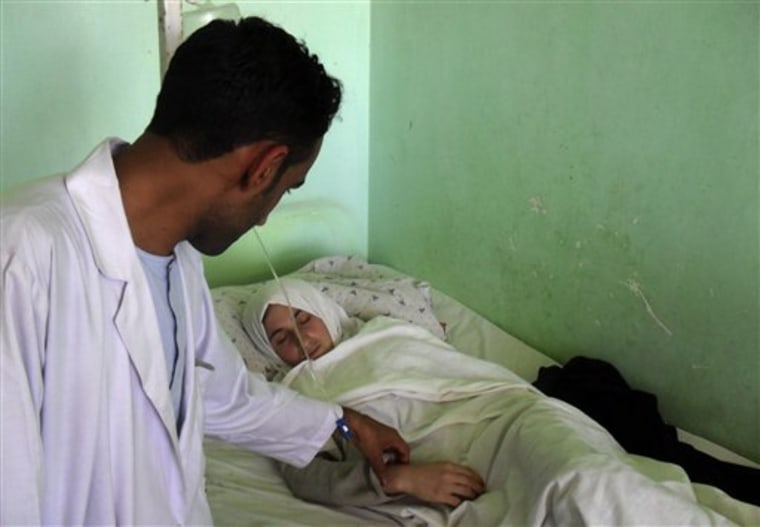More than 80 schoolgirls have fallen ill in three cases of mass sickness over the past week in northern Afghanistan, raising fears that militants who oppose education for girls are using poison to scare them away from school.
The latest case occurred Sunday when 13 girls became sick at school, Kunduz provincial spokesman Mahbobullah Sayedi said. Another 47 complained of dizziness and nausea on Saturday, and 23 got sick last Wednesday. All complained of a strange smell in class before they fell ill.
None of the illnesses have been serious, and medical officials were still investigating the exact cause. The Health Ministry in Kunduz said blood samples were inconclusive and were being sent to Kabul for further testing.
Sayedi blamed the sickness on "enemies" who oppose education for girls. Presidential spokesman Waheed Omar said any attempt to keep girls out of school is a "terrorist act."
The Taliban and other conservative extremist groups in Afghanistan who oppose female education have been known to target schoolgirls. Girls were not allowed to attend school when the Taliban controlled most of Afghanistan until they were ousted in the 2001 U.S.-led invasion.
Last year, dozens of schoolgirls were hospitalized in Kapisa province, just northeast of Kabul, after collapsing with headaches and nausea. An unusual smell filled the schoolyard before the students fell ill. The Taliban was blamed, but research into similar mass sickenings elsewhere has suggested that some might be the result of group hysteria.
Teachers stricken as well
Anesa, a 9-year-old girl who was among those hospitalized Sunday, said she noticed a strange odor and then saw two of her teachers fall unconscious.
"I came out from the main hall, and I saw lots of other girls scattered everywhere. They were not feeling good," said Anesa, who gave only her first name. "Then suddenly I felt that I was losing my balance and falling."
Azizullah Safar, head of the Kunduz hospital, said many of the girls were still suffering from pain, dizziness and vomiting.
"I was in class when a smell like a flower reached my nose," said Sumaila, 12, one of the girls hospitalized. "I saw my classmates and my teacher collapse and when I opened my eyes I was in hospital."
In the south and east, where the Taliban control towns and villages, girls' schools remain shut, teachers have been threatened and some girls have been attacked with acid.
Despite the attacks, Sumaila said she hoped to return to school, if her father allows her.
"I am very scared. My parents were very worried. My father told me that I have learned a lot. I don't know whether they will still let me go to school after this," she said.
In other developments:
- the Taliban said they shot down a helicopter early Sunday in western Farah province. Spokesman Qari Yousef Ahmadi claimed the attack in a call to The Associated Press but did not provide further details. NATO said a helicopter belonging to a civilian contractor was forced to make an emergency landing in Farah, but said the landing was due to reported mechanical problems. There were no initial reports of injuries, NATO said.
- A suicide bomber attacked private security guards while they were at a bazaar in southeastern Afghanistan, killing four Afghans and wounding 12, the government said. Two of the dead and five of the wounded worked for the U.S. Protection and Investigations security firm, an Interior Ministry statement said. The other victims were civilians.
- Witnesses said hundreds of people blocked a main road in Logar province, west of Kabul, and burned several trucks to protest what they said were civilian deaths in NATO operations. They gathered hours after NATO said coalition troops killed several insurgents and captured a Taliban sub-commander. "The people are very angry, they are saying these people killed are innocent civilians," provincial spokesman Din Mohammad Darwesh told The Associated Press.
Civilian deaths caused by U.S. and other international forces are highly sensitive in Afghanistan. Public outrage over such deaths prompted the top commander Gen. Stanley McChrystal last year to tighten the rules on the use of airstrikes and other weaponry if civilians are at risk.
Last week, hundreds of residents in Logar protested another NATO operation, saying they were not convinced the victims were actually Taliban fighters.
Logar is a strategic province because it controls southern land routes into Kabul, allowing weapons, explosives and fighters to move into the capital.
